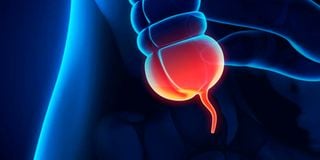Premium
Murang'a has an appendicitis problem. Here's why

The location of the appendix.
Medics at Maragua Level Four Hospital in Murang'a County have treated more than 1,000 patients ailing from appendicitis cases in the last five years.
While the condition is not considered life-threatening if caught early and treated, health experts are concerned about the spike in cases in the county.
Medics say consumption of sewage-contaminated water is the dominant cause of appendicitis in Murang'a South.
The Maragua Level Four Hospital medical superintendent, Dr Stephen Ngigi, told Nation.Africa that the oldest patient whose appendix had been removed was aged 81 and the youngest was 12.
“Appendicitis is a serious health issue as the contaminated water comes with several bacteria that inflame the appendix to a point that if it is not removed early enough, it bursts. Once the appendix gets inflamed and bursts, it becomes life-threatening,” he said.
The recommended medical action is to surgically remove it at the inflammation stage.
Dr Ngigi said that based on anecdotal evidence gathered by medics, it was clear that sewage-contaminated water is the common denominator.
“We have bacteria like pseudomonas that are found in soil and water and moist areas such as sinks and toilets. Those people who use borehole water especially in urban centres are at risk of this bacterial attack since sewer and urban water are relative,” Dr Ngigi said.
The symptoms of the condition include pain near the belly button accompanied by nausea, vomiting, loss of appetite, fever and chills. The appendix can rupture within 48 hours of the onset of symptoms and as late as 72 hours after.
Dr Ngigi said the best time to remove the appendix is before it ruptures because once it splits open, "it emits poisonous bacteria into the blood system causing a condition called sepsis — inflammation of the whole body — which kills painfully."
Sewer infrastructure
Attention has now turned to Murang'a's sewerage system. Woman Representative Sabina Chege, who is also the chair of the National Assembly’s Health Committee, has urged the Water and Sanitation ministry to respond to the challenge and provide area residents with sewage disposal infrastructure and clean tap water.
"We know that sewerage disposal infrastructure is less than two per cent in the area while access to clean water for domestic use is less than 30 per cent,” she said.
“Residents rely on septic tanks and open trenches for sewer disposal while procuring drinking water from vendors whose sourcing is not very hygienic."
For his part, Murang'a Governor Mwangi Wa Iria said the little available water should be made cost-friendly so it is accessible to all urban dwellers.
"That has been my warfront with water companies in this area...Their work has been increasing tariffs instead of connectivity. The little available water is made too costly and applications for new connections made too tedious," he said.
The governor said it is a constitutional right for all Kenyans to access clean water, adding that the water ministry and other stakeholders need to address that issue as a matter of urgency.
Water and Sanitation PS Joseph Wairagu said his ministry is committed to providing clean water to more than 60 percent of area residents by the close of next year.
He said there are ongoing projects to connect area homes to tap water worth more than Sh5 billion and Sh1.5 billion has been set aside to address sewerage infrastructure.





